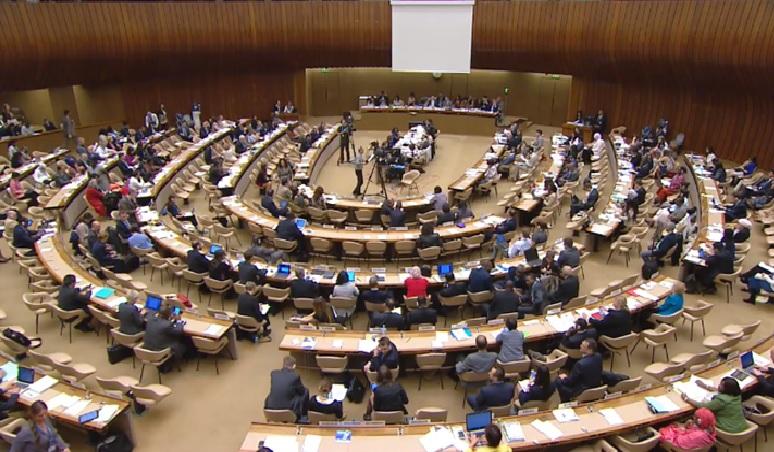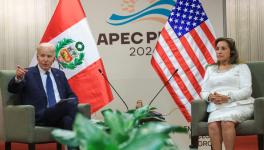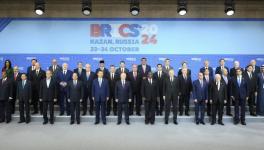Health for All, Except Women? Contestations on Women's Reproductive Rights at WHA72

Image for representational purpose only.
The article below is part of the ‘WHO-Watch’ program, which is an effort of the People’s Health Movement. The programme works towards democratising global governance for health and involving young activists in following the governing body meetings of the World Health Organisation – the Executive Board meeting in January and the World Health Assembly in May – every year.
This year, the World Health Assembly was made a stage for the United States to display its regressive agenda on women’s sexual and reproductive health rights. Not so long ago, in April, the country had already exercised its power in the United Nations Security Council on the same topic. Pressure from the Trump administration has removed references to sexual health from a resolution against sexual violence during conflict. The original resolution, proposed by Germany, said that women who had been raped needed access to safe abortions, as well as reproductive and sexual healthcare. But the document approved by the Security Council by a vote of 13-0, with Russia and China abstaining, had all language relating to “sexual and reproductive health” rights removed.
Back in Geneva, in a forum where all countries have the right to vote, US tactics changed. While commenting upon the preparation of an incoming UN High Level Meeting on Universal Health Coverage, the US complained about the sexual and reproductive health rights language used in the documents, arguing that it “promotes abortion” in the general population and “sex among teenagers”.
The statement stirred waters before the opening of the discussion on the Global Strategy for Women’s, Children’s and Adolescents’ Health (2016-2030) and is another move made in a broader attempt by the US to limit the debate on the topic. This includes discouraging the inclusion of sexual and reproductive health rights into health agendas on both the national and international levels, which began with the presidency of Donald Trump. Once in office, he started implementing the so-called ‘Global Gag Rule’, a foreign policy which prohibits organisations receiving financial support and grants from the US to advocate for abortion law reform, and bars them from providing abortions and referrals.
Taking into consideration abortion bans that have recently been signed into law in several US states, the fact that the country successfully manages to hamper measures by international organisations that are designed to respect, protect, promote and fulfill women’s sexual and reproductive health rights is disturbing. This rings as particularly true if we take into consideration the negative effects that limiting sexual and reproductive health care, and especially abortion services, has on the health and lives of women and girls around the world. In a recent statement on access to safe, quality and legal abortion, People’s Health Movement (PHM) has once again warned that the current conservative discourse on sexual and reproductive health rights, supported widely by the US, is inseparably linked to occurrence of women’s deaths from unsafe abortion.
The burden of such deaths is concentrated in low-income countries that are very much affected by the implementation of the Global Gag Rule, which is also “an indication of global inequities in health and health care”, as underlined by PHM. Nevertheless, opposition to usage of sexual and reproductive health rights terminology continued during the discussion on the Global Strategy for Women’s, Children’s and Adolescents’ Health, when the US once again stated their wish to have the World Health Organization (WHO) turn its attention away from the issue.
In a statement delivered on behalf of itself, Brazil, Egypt, Saudi Arabia, Haiti, Nigeria, Ghana and Iraq, the US delegate insisted that the family is the “foundation of society” and asked WHO to stop using “ambiguous and unclear” terms such as sexual and reproductive health rights, again linking them to the promotion of abortion. The statement urged WHO to focus on issues that “unite, rather than divide” in the context of women’s health – insinuating that an appropriate context of discussing women’s health in WHO is only that of motherhood.
Another approach was offered by a number of high-income countries, among them Canada, France, Sweden, and the Netherlands, who highlighted the importance of women’s access to both sexual education and access to basic sexual and reproductive health care for leading lives marked by wellbeing and dignity.
Canada, in particular, made it a point throughout this year’s World Health Assembly to refer to the feminist policy it is pursuing at home and abroad, making their statements an interesting effort to mainstream women’s and girls’ rights language in all topics and policies. In fact, in 2017 the government of Canada announced a commitment to empower women and girls around the world, especially when it comes to sexual and reproductive health, and in part by supporting projects that provide access to legal and safe abortion. Even though their approach has been criticised from the very beginning for maintaining standard aid dynamics and implementing a top-down approach to women’s empowerment, on this occasion, statements by Canadian delegates ensured that issues related to sexual and reproductive health care are not swept under the rug.
Another important point raised by a youth delegate from Denmark was the availability of sexual education programmes for adolescents and youth, and their role in improving the health of this group. In fact, parallel to more conservative policies being implemented in the area of women’s health, changes have been noted in the representation and content of sexual education programmes: in some countries, such content is being systematically removed from public education curricula, ignoring all the health benefits it can have for adolescents. In fact, in addition to providing important information on contraception and sexually transmitted diseases, comprehensive sexual education programmes offer a space to discuss and promote the importance of sexual and reproductive health rights.
However, the intervention by Denmark did not lead to further discussion. Remaining statements focused mainly on issues surrounding maternal and newborn health, nutrition and HPV vaccination. More than an expression of lack of interest from a lot of low and middle-income countries on issues surrounding sexual and reproductive health rights, this can be understood as a consequence of WHO’s conflating of three major topics – women’s, children’s, and adolescents’ health – into one discussion. Because of this, member states are mostly forced to focus on the issues that are most pressing in the local context, sacrificing a more in-depth analysis of others.
It remains unclear how WHO will move forward when talking about sexual and reproductive health rights. It also remains unclear if the Trump administration will win a second term and, as a possible consequence, deepen this anti-rights, anti-science and anti-women agenda. However, with the election of other similar characters and the rise of conservative right-wing governments all over the world, we should expect more attempts in a very wrong direction. Brazil is a good example of this bad trend.
The country is experiencing many changes, both on the symbolic and practical front. After the impeachment of former president Dilma Rousseff, the office of the Secretary for Women – which had the status of a ministry – was dismantled. Under Jair Bolsonaro´s government, it was reinstated, but as a single office dealing with human rights. And family. In this context, minister Damares Alves announced that her priority will be to push for the approval of the ‘Statute of the Unborn Child’, a set of legislative changes that are already being discussed in Congress that would revoke the already strict scenarios in which women in Brazil have the legal right to seek abortion services (e.g. if they were raped; if the fetus is anencephalic; or if the pregnancy puts the woman’s life at risk). "We will establish public policies for the baby in the mother's belly in this nation," said Alves.
In the Ministry of Health, things are equally worrisome. In one of his live broadcasts on Facebook, Bolsonaro suggested that parents should tear apart a handbook with guidelines on the health of adolescents because it addressed changes in the body, first menstruation, and prevention of pregnancy and sexually transmitted diseases. The guideline took two years of preparation and was tested by health experts in five big cities before it was distributed in schools.
Taking all of this into consideration, in national and international scale, and regarding member states or WHA itself, a stronger engagement of women’s rights groups will be crucial in the following years. As recent examples of mass mobilisation for the right to abortion in Argentina, South Korea, the USA, and Ireland have shown, women around the world are ready to put up a fight on all fronts to ensure that reproductive health care is included in health systems and made accessible to everyone.
The above article is compiled with contributions from Alane Ribeiro ( Brazil), Ana Vracar (Croatia), Ben Eder (UK), Gargeya Telakapalli (India) Sun Kim ( South Korea), Stuti Pant (UK), Lucy Singh (UK), Maira Mathias (Brazil), Sophie Gepp (Germany) and Andrew Harmer (UK).
Get the latest reports & analysis with people's perspective on Protests, movements & deep analytical videos, discussions of the current affairs in your Telegram app. Subscribe to NewsClick's Telegram channel & get Real-Time updates on stories, as they get published on our website.
























